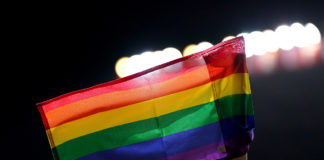
It’s “people like you that can’t stop going to orgies getting the rest of us killed,” the guy screamed into Jay’s face, as Jay balanced his Trader Joe’s grocery bag and tried to keep his composure.
Jay got off at the next stop, and the man who raged at him didn’t follow. But the man’s hatred — and the silence of others in the Metro car and on the platform after he left the scene — is jarring in a nation where same-sex marriage is legal but discrimination against someone based on who they love is not.
Statistics show that incidents like this — and far worse — are on the rise as public health workers already are combating the stigma surrounding monkeypox, a virus shared through close personal contact that can infect anyone but has predominantly hit gay men.
Anti-LGBT mobilization, including demonstrations, political violence and offline propaganda, more than quadrupled in the United States from 2020 to 2021 — from 15 incidents to 61, according to the global conflict monitoring group ACLED. This year has already had more attacks than all of last year, the group said.
You can see it on a small level in D.C., too.
In 2015, when the Supreme Court’s decision on Obergefell v. Hodges guaranteed the right to same-sex marriage across the nation, D.C. police recorded 10 anti-LGBTQ hate crimes.
As hate speech escalated in the following years, attacks in D.C. nearly tripled from 2018 to 2020. We’ve already had 23 attacks in D.C. this year, compared with 17 the same time last year.
The bile also escalated to physical violence earlier this month in Shaw, when two gay men walked past a group of teens, who yelled anti-gay slurs and howled about monkeypox before throwing punches, hitting the victims in their faces, breaking eyeglasses and knocking them to the ground, police said.
Jay heard about the violence of the HIV/AIDS era and the 1980s. But he’s part of an LGBTQ generation that has come of age and come out as the nation legalized same-sex marriage and our culture seemed to begin a real shift away from hysterical homophobia. He spoke on the condition that his last name not be used, to protect his privacy,
You can get a real sense of how far we’ve come if you dive into the Netflix series expanding the story told in the beloved movie about women’s professional baseball during World War II, “A League of their Own.” The series (which our family has binged all week), delivers the dangers — jailing, beating, death — that the queer community faced during the time that so many believed was great in America.
And now, monkeypox. In D.C. — which at 350 cases as of Thursday has more than any state — violence and rancor are back in style.
Health departments have struggled with messaging as ignorance gallops past common sense to embolden another generation of hater.
For five years, Jay lived in a city where he could hold a man’s hand in public, go to a gay bar without fear of arrest, and wear pink and not be harassed.
And then the hate — so much of it spoken hundreds of miles away — escalated.
In Idaho, a pastor told his Boise congregation in May that gay, lesbian and transgender people should be executed by the government.
Florida Gov. Ron DeSantis (R) said parents who take their kids to a drag show — even a family-friendly one that set him off in June — should be investigated.
In Texas, a pastor railed against Pride month and said LGBTQ people “should be lined up against the wall and shot in the back of the head.”
Florida passed the “don’t say gay” bill, forbidding teachers to discuss sexual orientation in the classroom.
“When you see the actual repercussions of all this rhetoric,” said Jay, “it brings home how powerful that is.”
And now, extremists are hinting that children diagnosed with monkeypox (there have been nine in the United States so far) were victims of sexual abuse.
But sex isn’t the only way to get monkeypox. Health officials said it can spread through any skin-to-skin contact (which includes holding, cuddling and feeding if you’re asking about children) and through towels, bedding, cups and utensils.
Nevertheless, the ignorance continues.
Sound familiar? It should.
Take this 1986 excerpt from New York Times coverage of a congressional hearing on AIDS: “The homosexual rights groups say that homosexuals have always been victims of violence but that the attacks have become more brutal and more frequent and that the assailants have increasingly referred specifically to acquired immune deficiency syndrome.”
Eventually, much of America figured out that you can’t get HIV/AIDS from sitting at the same desk as someone who has it (as I remember one football player arguing in a debate we had about it in high school). Being HIV-positive is no longer a death sentence.
Medicine eventually caught up. But we as a nation, apparently, have not.







